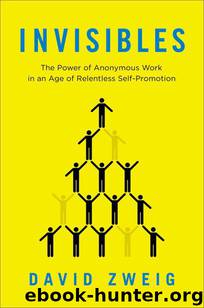Invisibles: The Power of Anonymous Work in an Age of Relentless Self-Promotion by David Zweig

Author:David Zweig [Zweig, David]
Language: eng
Format: epub
Publisher: Penguin Group US
Published: 2014-06-12T03:00:00+00:00
The thing that I am the luckiest with is I’ll get a script like Michael Clayton, and Michael Clayton is not a film about a guy who tries to solve the murder of his best friend and sort of fails and then figures out some way of blackmailing the woman who has murdered all these people. Michael Clayton is about a guy who finds himself at the age of forty-eight completely bereft of any personal sense of dignity, who has slowly lost every part of him that he used to think was important. He has no self-respect left. He is a shill; he is a prostitute; he is a living version of everything that when he was twenty-two years old probably disgusted him. And it happened so slowly he never figured it out. And he’s given the opportunity at some point to find himself again. That’s what Michael Clayton is about.
The above text is not from George Clooney expounding on his motivation. It’s Elswit simply talking about the film. While we’ve established his deference to his directors, and his respect for his collaborators, his ultimate duty is servicing the story. Elswit is gregarious and generous with his time. During all of our extensive interactions, meeting in person for lengthy interviews, meeting on set, and multiple phone conversations, the thing that struck me was that he was as animated, if not more so, talking about the stories that drive the films he’s worked on or admires as he was discussing the specifics of his craft. It’s this macro view of his role that ultimately informs his work. (What’s amazing is that, unlike, say, many CEOs, whose role is to provide a 30,000-foot view of a company’s strategies, and unlike technicians who spend every day buried in the details of their work, Elswit merges both roles.)
“If you have a multi-character film,” and you’ve done the right prep, “you’ve made real choices about what’s different between the five stories you’re telling,” he said. “For instance, in Syriana: Jeffrey Wright’s role, Matt Damon’s role, George Clooney’s role. Each of these characters are lit the same. Or slightly differently. Or do we light the locations differently? It’s always story-driven and story-specific. Or character-driven and character-specific.”
“What cinematographers know is that lighting, because of the way people see, the way people view pictures—going all the way back to art-history land, when they’re looking at figurative art—is the most direct way of communicating with someone’s feelings,” Elswit told me. “Other than music, in movies, it’s the most direct way to speak to someone’s feelings. And a lot of directors don’t think that way or they don’t care. But cinematographers do.” He went on, “It’s really about how you’re lighting human beings and how you’re lighting the rooms they live in or the spaces they’re in. You’re trying to make an emotional link in some way between what’s going on in the story and what it looks like. It’s about feelings, and it’s about emotion.”
In the 1930s, film stocks of the time had technical limitations that required a lot of light.
Download
This site does not store any files on its server. We only index and link to content provided by other sites. Please contact the content providers to delete copyright contents if any and email us, we'll remove relevant links or contents immediately.
| Ethics | Etiquette |
| Fashion & Image | Health & Stress |
| Motivation & Self-Improvement | Work Life Balance |
| Workplace Culture |
Tools of Titans by Timothy Ferriss(8368)
Change Your Questions, Change Your Life by Marilee Adams(7760)
Deep Work by Cal Newport(7066)
Playing to Win_ How Strategy Really Works by A.G. Lafley & Roger L. Martin(6247)
Man-made Catastrophes and Risk Information Concealment by Dmitry Chernov & Didier Sornette(6007)
Big Magic: Creative Living Beyond Fear by Elizabeth Gilbert(5756)
Digital Minimalism by Cal Newport;(5750)
Ego Is the Enemy by Ryan Holiday(5415)
The Slight Edge by Jeff Olson(5410)
The Motivation Myth by Jeff Haden(5205)
The Laws of Human Nature by Robert Greene(5173)
Stone's Rules by Roger Stone(5081)
Tuesdays with Morrie by Mitch Albom(4770)
Eat That Frog! by Brian Tracy(4526)
Rising Strong by Brene Brown(4451)
Skin in the Game by Nassim Nicholas Taleb(4239)
The Money Culture by Michael Lewis(4198)
Bullshit Jobs by David Graeber(4179)
Skin in the Game: Hidden Asymmetries in Daily Life by Nassim Nicholas Taleb(3991)
